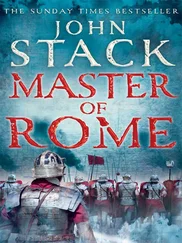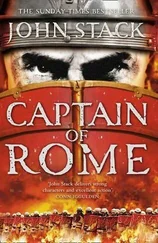‘Land ahead!’
Instinctively the three men glanced up to the masthead lookout.
‘Sicily,’ Atticus remarked to himself, anticipation in his voice.
Duilius turned to the captain by his side, seeing the steady gaze of the younger man, sharing the pent-up expectancy. The junior consul had chosen the Aquila as his flagship and so the galley sailed in the vanguard of the fleet. To his left and right the new fleet of galleys spread out in a rough arrow formation, the flanks held by experienced galleys of the Ostia fleet and others requisitioned from Naples and Capua. Duilius could not help feeling immense pride at Rome’s achievement, the fleet of one hundred and forty ships, both new and old, testament to the Republic’s strength.
Atticus consulted the map spread out on a small table on the aft-deck, briefly consulting with Gaius as each man recognized features of the familiar coast. The captain nodded briefly as agreement was reached and Gaius altered the course of the lead galley to turn the fleet west. Signals were exchanged from the stern rail and Atticus noted with confidence that the captains of the new galleys matched his course while maintaining formation.
‘That’s the Cape of Mylae,’ Atticus explained to Duilius and Septimus as he pointed to a headland five miles ahead off the port quarter. ‘And those are the Aeolian Islands,’ indicating a darker mass of land on the starboard quarter horizon.
‘How far beyond is Brolium?’ Duilius asked.
‘Roughly twenty-five miles beyond the cape, a little over four hours at our current speed,’ Atticus replied automatically, his own thoughts also focused on the distant islands. He wondered if the Carthaginian fleet had left the island or if they were still at the port city. Either way he relished the encounter, and Atticus recited a vow to make them pay a heavy price.
‘Enemy galleys dead ahead!’
Gisco reacted instantly to the call.
‘Signal all galleys. Enemy sighted. Battle formation!’
The crewmen responded immediately, rushing to transmit the commands to the ships on the left and right flanks.
‘Battle speed!’ Gisco ordered the helmsman and the Melqart sprang forward as the ship’s oars were engaged.
The admiral walked calmly to the bow, his unhurried steps in contrast to the frenzied activities of the crew as final preparations for battle were made. As he walked up the steps to the foredeck, he caught sight of the approaching Roman galleys. Their sails were lowered against the oncoming wind, relying solely on oar power to propel them through the channel. Gisco smiled coldly as the order was given for his own sail to be lowered and secured against the lifting yard. The Carthaginian fleet had arrived on station under sail and their rowers would be fresher as battle was joined.
Gisco looked left and right as his fleet moved into formation. His own ship was in the centre of the three-mile line, with the remaining quinqueremes interspersed among the triremes. Boodes, his most trusted squad commander, was anchoring the starboard flank against any attempt to escape to Brolium while the port flank was held by Hamilcar to cut off retreat to the Aeolians.
The admiral stared across the five-mile gap to the Roman galleys, his eyes narrowing in hate as he watched them deploy into a line of battle. Over a year before, Gisco had been forced to abandon the city of Agrigentum in the face of the Roman legions. He had believed his army unbeatable but the Romans had shamed him. He now twisted the bitter memory into pure malice for the enemy. There would be no repeat of his ignominious defeat.
‘Damn it, Lucius, signal them to hold the line!’
Atticus continued to look left and right as the Aquila reached her full battle speed. Lucius bellowed over the side rail for the order to be passed down the line, the command having an immediate effect on those who heard it directly. The line of battle had been slow to form and was now becoming ragged as the ships increased to battle speed. Each ship was guarding the flanks of her port and starboard cohorts, the very reason for line-of-battle formation. If the Roman line struck the Carthaginians unevenly, many ships would be immediately exposed to the deadly rams of the enemy. The experienced galleys on the flanks worked hard to dress the line and slowly the formation re-established cohesion.
Atticus grunted his satisfaction and turned once more to the approaching enemy ships, now only three miles away. They were in perfect line-of-battle formation, their expert seamanship evident in the quick collapse of their sails and steady spacing between each ship. The Carthaginians would try to run through the line of Roman ships, destroying the formation so that every ship would have to fight as a single entity. The Roman plan was to engage the Carthaginians at the first point of contact, turning their bows into the enemy’s and stopping them from breaching the line. It was a tactic never tried before, but Atticus could think of no other that would allow for maximum use of the corvus.
As the Roman captain took one more look to his port and starboard, he could see that some galleys were still not fully in line. The air was filled with shouted orders as ships’ captains commanded their crews and coordinated with their flanking galleys to keep formation. A sliver of doubt rose in Atticus’s thoughts as he recalled the command crews’ lack of experience. The final week in Ostia had been consumed in relentless training of the crews on how to use the corvus. The first head-on contact was crucial. After that the Carthaginians would have the advantage.
Septimus breathed easily as he looked over the faces of his demi-maniple of the Fourth. Only the faces in the front row were familiar, the remaining six members of his own marine command. The rest of his former command were scattered amongst the legionaries of the new fleet, their fluency in boarding providing each party with a backbone of experience. As Septimus’s glance reached the end of the line, he nodded to his new optio. Quintus had also been reassigned and was now commanding a demi-maniple of his own, while Septimus had been given a tough second officer of the Fourth. He was an older man of few words, but the men respected him and he would anchor and steady the line on the enemy deck.
Septimus could sense the impatience of the legionaries. They were men of the Fourth, the Boar. Their legion had been dishonourably wounded at Lipara and the loss of twelve hundred of their comrades called for vindicta , revenge on the hated Punici. Over the years Septimus had heard many words spoken to troops before battle. In his time as centurion he had given such orations himself, a way to rally his command before battle, the words spoken to whip up the men’s fighting frenzy. With cold realization he knew only two words would be needed that day to unleash their fury. As he heard the shouted command for the galley to increase to attack speed, he drew his gladius , knowing that the enemy were close. The eyes of sixty men were locked on Septimus, ignoring the approaching enemy over the centurion’s shoulders. Septimus raised his sword.
‘Avenge Lipara!’
The men roared with demonic blood lust, a roar of pure aggression. Septimus smiled grimly. They were ready.
Atticus felt his mind clear as the Aquila moved to attack speed. He instinctively looked left and right at the battle line to watch the other galleys match his speed. They were committed. At attack speed, the final gap of a mile would be closed in less than two minutes. There was no time for final changes, no time for doubts. His whole being became focused on the enemy before him. Over the preceding weeks he had begun to consider the enemy in abstraction, a faceless foe to be outwitted and outmanoeuvred. Now he vividly recalled each encounter, the dishonour of fleeing in the Strait of Messina still sharp, as was the rage he felt at the slaughter of the transport fleet at Brolium.
Читать дальше
Конец ознакомительного отрывка
Купить книгу











